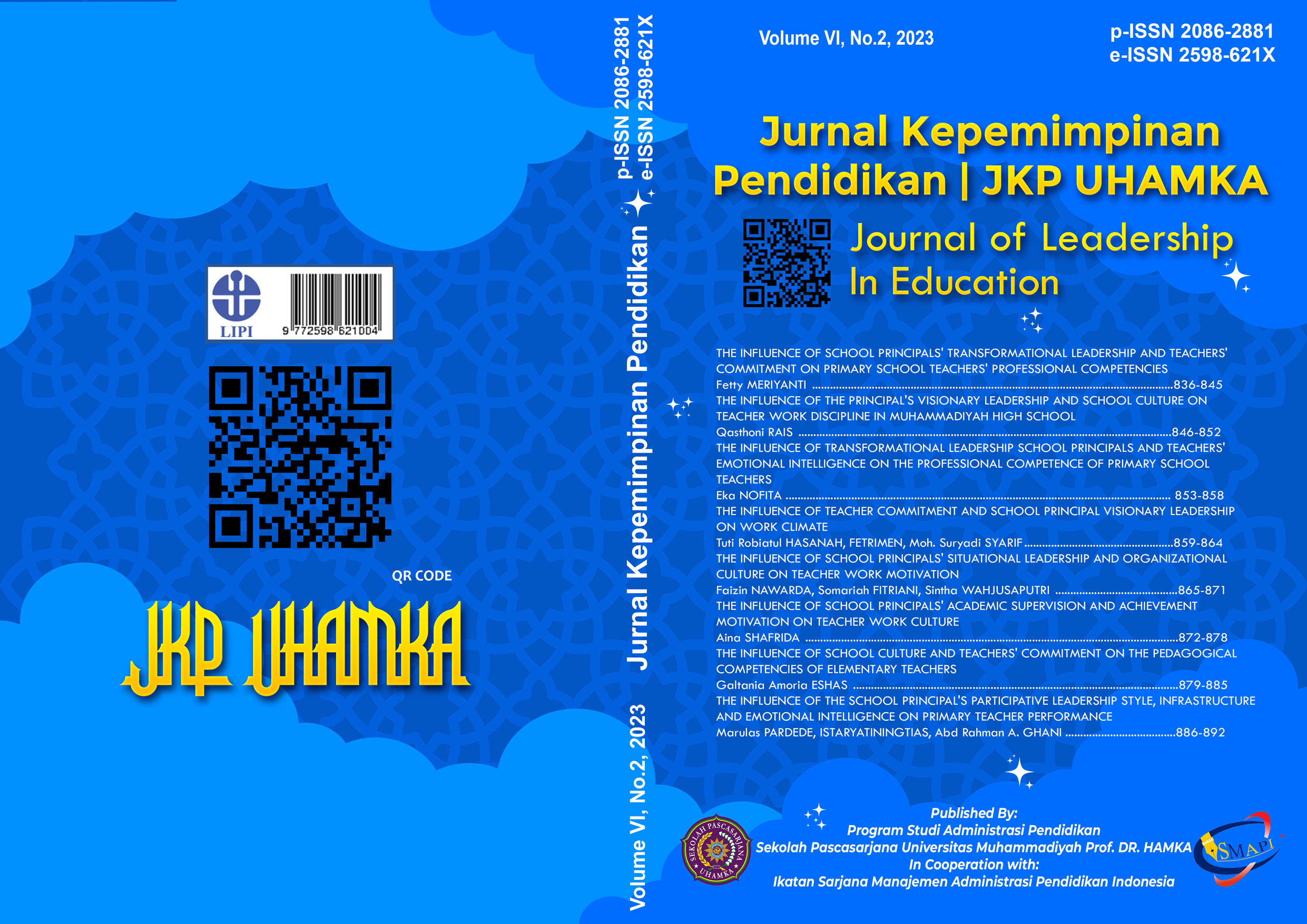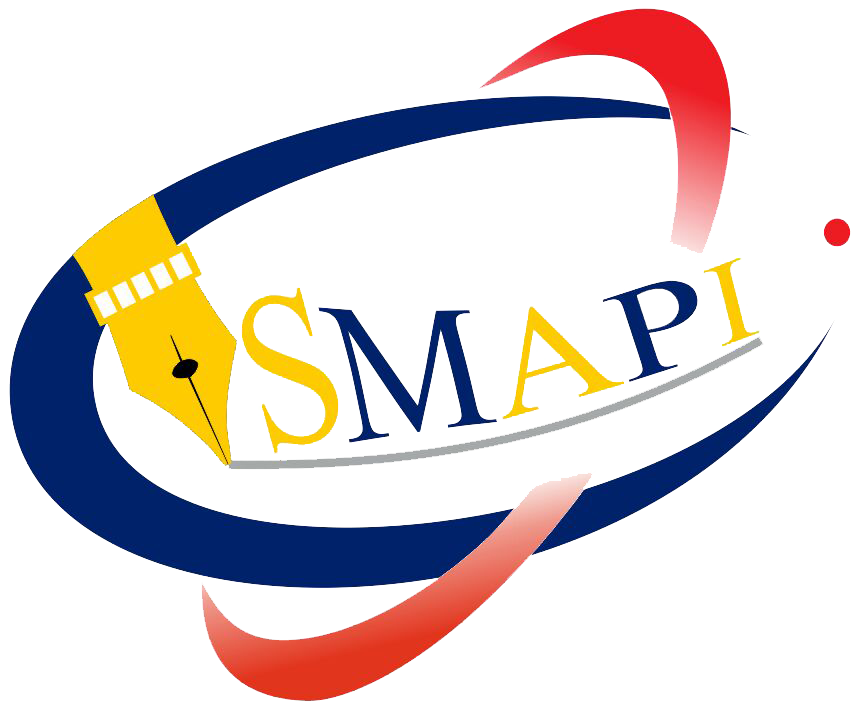THE INFLUENCE OF THE SCHOOL PRINCIPAL'S PARTICIPATIVE LEADERSHIP STYLE, INFRASTRUCTURE AND EMOTIONAL INTELLIGENCE ON PRIMARY TEACHER PERFORMANCE
DOI:
https://doi.org/10.22236/jkpuhamka.v6i2.14516Keywords:
Participative Leadership Style, infrastructure, emotional intelligence, teacher performanceAbstract
This research was conducted with the aim of determining the impact of the principal's participative leadership style, infrastructure and emotional intelligence on the performance of elementary school teachers in Kembangan District, West Jakarta. This research is quantitative because the data analyzed is in the form of numbers obtained from respondents' answers which were distributed to 85 elementary school teachers. The research is contextual operational in nature by using hypothesis testing to make temporary guesses regarding the influence of the independent variable on the dependent variable. Data collection was carried out using a Google Form questionnaire with a horizontal time is cross sectional. The results of research conducted with the help of Smartpls statistical software are that the principal's participative leadership style has no effect on teacher performance, while infrastructure and emotional intelligence have an influence on teacher performance
Downloads
References
Abdo, M., Feghali, K., & Zgheib, M. A. (2022). The role of emotional intelligence and personality on the overall internal control effectiveness: applied on internal audit team member’s behavior in Lebanese companies. Asian Journal of Accounting Research, 7(2), 195–207. https://doi.org/10.1108/AJAR-04-2021-0048
Alwali, J., & Alwali, W. (2022). The relationship between emotional intelligence, transformational leadership, and performance: a test of the mediating role of job satisfaction. Leadership and Organization Development Journal, 43(6), 928–952. https://doi.org/10.1108/LODJ-10-2021-0486
Ananda, R., & Banurea, O. K. (2017). Manajemen Sarana dan Prasarana Pendidikan. Widaya Puspista.
Angrainy, A., Fitria, H., & Fitiani, Y. (2020). Pengaruh Sarana Prasarana dan Lingkungan Kerja terhadap Kinerja Guru. Journal of Education Research, 1(2), 154–159. https://doi.org/10.37985/joe.v1i2.15
Elfiza, E., Gusnardi, G., & Sumarno, S. (2022). Pengaruh Sarana Prasarana Sekolah Dan Komunikasi Interpersonal Terhadap Kinerja Guru. JURNAL PAJAR (Pendidikan Dan Pengajaran), 6(5), 1265. https://doi.org/10.33578/pjr.v6i5.8334
Ghozali, I. (2021). Aplikasi Analisis Multivariate dengan Program IBM SPSS 25. Badan Penerbit Universitas Diponegoro.
Goleman. (2016a). INTELIGENCIA EMOCIONAL (Kairos (ed.)). https://www.ptonline.com/articles/how-to-get-better-mfi-results
Goleman, D. (2016b). Emotional Intelligence: Kecerdasan Emosional (Alih Bahasa: T. Hermaya). PT Gramedia Pustaka Utama.
Hameli, K., & Ordun, G. (2022). The mediating role of self-efficacy in the relationship between emotional intelligence and organizational commitment. European Journal of Management Studies, 27(1), 75–97. https://doi.org/10.1108/ejms-05-2021-0033
Hasibuan, M. (2018). Manajemen Sumber Daya Manusia. Bumi Akssara.
Hasibuan, M. (2020). Organisasi dan Motivasi Dasar Peningkatan Produktifitas. Bumi Aksara.
Hidayatullah, R. (2018). Faktor-faktor yang Mempengaruhi Kinerja Guru IPS SMP dan MTS di Kecamatan Marioriwawo Kabupaten Soppeng. Jurnal Universitas Negeri Makassar, 1(1), 1–21.
Irawan, I. (2015). Pengantar Manajemen Sarana dan Prasarana Sekolah. Deepublish.
Istaryatingtias, & Khuluqo, I. El. (2019). Leadership model of principal on teachers at disability elementary school in the department of education region 1 jakarta, indonesia. International Journal for Studies on Children, Women, Elderly And Disabled, 6(Jan), 148–152.
Kasmir. (2022). Manajemen Sumber Daya Manusia (Teori dan Praktek). PT. RajaGrafindo Persada.
Komara, E., Mulyanto, A., Rahman, I. A., Karimah, I., & Ibrahim, D. Z. (2023). Implementasi Kepemimpinan Partisipatif dalam Manajemen Pendidikan Anak Usia Dini di TK Radhi Ibrahim Nurfadilah (RIN) Baleendah. Jurnal Ilmiah Mandala Education, 9(3), 1567–1571. https://doi.org/10.58258/jime.v9i3.5205
Mulyasa. (2014). Pengembangan dan Implementasi Kurikulum 2013. Remaja Rosdakarya.
Mustafa, M. J., Vinsent, C., & Badri, S. K. Z. (2022). Emotional intelligence, organizational justice and work outcomes. Organization Management Journal. https://doi.org/10.1108/omj-08-2021-1322
Nabila, M., & Ghani, A. R. A. (2020). Implementasi Gaya Kepemimpinan Situasional Kepala Sekolah Memasuki Pembelajaran Tatap Muka. Jurnal Basicedu, 6(3), 5115–5123. https://journal.uii.ac.id/ajie/article/view/971
Nasution, N., . P., Sonti, E., Taufik, R., & Daulay, M. A. (2021). Pengaruh Gaya Kepemimpinan Partisipatif, Disiplin Kerja Dan Lingkungan Kerja Terhadap Kinerja Guru Di Sma Negeri 1 Na Ix-X Kabupaten Labuhanbatu Utara. JRAM (Jurnal Riset Akuntansi Multiparadigma), 7(2), 208–216. https://doi.org/10.30743/akutansi.v7i2.3378
Noor, J. (2015). Analisis Data Penelitian Ekonomi & Manajemen Cetakan Kedua. PT. Remaja Rosdakarya.
Novita, N., Kale, O., Ekonomi, F., Bisnis, D., Budi, U., & Jakarta, L. (2023). Nanda Novita, Oki Kale Fakultas Ekonomi Dan Bisnis Universitas Budi Luhur Jakarta, Indonesia. 3(8), 692–702.
Priansa, D. (2019). Perencanaan & Pengembangan SDM. Alfabeta.
Rismita, R., Khuluqo, I. El, Istaryatiningtias, I., & Hendra, A. N. (2020). The Selection of Outstanding Teachers to the Determination of Ranking on Professional and Intellectual Managerial Performances. Al-Ta Lim Journal, 27(1), 72–79. https://doi.org/10.15548/jt.v27i1.602
Robbins, & Judge. (2015). Organizational Behavior (15th ed). Prentice Hall.
Sancoko, C. H., & Sugiarti, R. (2022). Kinerja Guru Dan Faktor Yang Mempengaruhinya. Jurnal Pendidikan Rokania, 7(1), 1–14.
Sekaran, U., & Bougie, R. (2020). Research Methods For Business: A Skill Building Approach (8th ed.). Wiley.
Selvi, A. J. A., & Aiswarya, B. (2022). Examining the relationship between emotional intelligence and work engagement of automobile sector employees in Chennai. Rajagiri Management Journal. https://doi.org/10.1108/ramj-03-2022-0052
Sugiyono. (2019). Metode Penelitian Kuantitatif, Kualitatif, dan R&D. Alphabet.
Suleman, Q., Syed, M. A., Mahmood, Z., & Hussain, I. (2020). Correlating Emotional Intelligence With Job Satisfaction: Evidence From a Cross-Sectional Study Among Secondary School Heads in Khyber Pakhtunkhwa, Pakistan. Frontiers in Psychology, 11(March), 1–14. https://doi.org/10.3389/fpsyg.2020.00240
Ugoani, J. N. N. (2016). Emotional Intelligence and Organizational Competitiveness: Management Model Approach. Independent Journal of Management & Production, 7(3), 786–806. https://doi.org/10.14807/ijmp.v7i3.427
Wirawan. (2018). Kepemimpinan (Teori, Psikologi, Perilaku Organisasi, Aplikasi, dan Penelitian). PT Raja Grafindo Persada.
Yantoni, R. (2020). Pengaruh Kepemimpinan Partisipatif Terhadap Kinerja Guru Sd Negeri Kabupaten Kaur. Manajer Pendidikan: Jurnal Ilmiah Manajemen Pendidikan Program Pascasarjana, 14(3), 1–5. https://doi.org/10.33369/mapen.v14i3.11717
Yusuf, M., Chahyono, C., & Abduh, T. (2021). Pengaruh Kepemimpinan Kepala Sekolah, Kelengkapan Sarana Prasarana Sekolah Dan Komitmen Organisasi Terhadap Kinerja Guru Smp Se-Kecamatan Balocci Kabupaten Pangkep. Indonesian Journal of Business and Management, 4(1), 132–138. https://doi.org/10.35965/jbm.v4i1.1197

Downloads
Published
How to Cite
Issue
Section
License
Copyright (c) 2024 Marulas PARDEDE, Istaryatiningtias ISTARYATININGTIAS, Abd Rahman A. GHANI

This work is licensed under a Creative Commons Attribution 4.0 International License.














